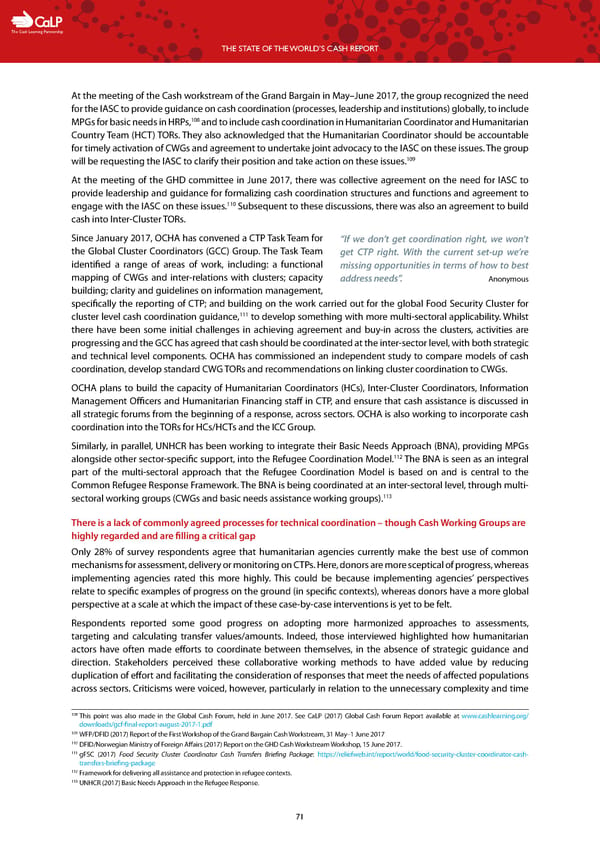C The Cash Learning Partnership THE STATE OF THE WORLD’S CASH REPORT At the meeting of the Cash workstream of the Grand Bargain in May–June 2017, the group recognized the need for the IASC to provide guidance on cash coordination (processes, leadership and institutions) globally, to include 108 MPGs for basic needs in HRPs, and to include cash coordination in Humanitarian Coordinator and Humanitarian Country Team (HCT) TORs. They also acknowledged that the Humanitarian Coordinator should be accountable for timely activation of CWGs and agreement to undertake joint advocacy to the IASC on these issues. The group 109 will be requesting the IASC to clarify their position and take action on these issues. At the meeting of the GHD committee in June 2017, there was collective agreement on the need for IASC to provide leadership and guidance for formalizing cash coordination structures and functions and agreement to 110 engage with the IASC on these issues. Subsequent to these discussions, there was also an agreement to build cash into Inter-Cluster TORs. Since January 2017, OCHA has convened a CTP Task Team for “If we don’t get coordination right, we won’t the Global Cluster Coordinators (GCC) Group. The Task Team get CTP right. With the current set-up we’re identified a range of areas of work, including: a functional missing opportunities in terms of how to best mapping of CWGs and inter-relations with clusters; capacity address needs”. Anonymous building; clarity and guidelines on information management, specifically the reporting of CTP; and building on the work carried out for the global Food Security Cluster for 111 cluster level cash coordination guidance, to develop something with more multi-sectoral applicability. Whilst there have been some initial challenges in achieving agreement and buy-in across the clusters, activities are progressing and the GCC has agreed that cash should be coordinated at the inter-sector level, with both strategic and technical level components. OCHA has commissioned an independent study to compare models of cash coordination, develop standard CWG TORs and recommendations on linking cluster coordination to CWGs. OCHA plans to build the capacity of Humanitarian Coordinators (HCs), Inter-Cluster Coordinators, Information Management Officers and Humanitarian Financing staff in CTP, and ensure that cash assistance is discussed in all strategic forums from the beginning of a response, across sectors. OCHA is also working to incorporate cash coordination into the TORs for HCs/HCTs and the ICC Group. Similarly, in parallel, UNHCR has been working to integrate their Basic Needs Approach (BNA), providing MPGs 112 alongside other sector-specific support, into the Refugee Coordination Model. The BNA is seen as an integral part of the multi-sectoral approach that the Refugee Coordination Model is based on and is central to the Common Refugee Response Framework. The BNA is being coordinated at an inter-sectoral level, through multi- 113 sectoral working groups (CWGs and basic needs assistance working groups). There is a lack of commonly agreed processes for technical coordination – though Cash Working Groups are highly regarded and are filling a critical gap Only 28% of survey respondents agree that humanitarian agencies currently make the best use of common mechanisms for assessment, delivery or monitoring on CTPs. Here, donors are more sceptical of progress, whereas implementing agencies rated this more highly. This could be because implementing agencies’ perspectives relate to specific examples of progress on the ground (in specific contexts), whereas donors have a more global perspective at a scale at which the impact of these case-by-case interventions is yet to be felt. Respondents reported some good progress on adopting more harmonized approaches to assessments, targeting and calculating transfer values/amounts. Indeed, those interviewed highlighted how humanitarian actors have often made efforts to coordinate between themselves, in the absence of strategic guidance and direction. Stakeholders perceived these collaborative working methods to have added value by reducing duplication of effort and facilitating the consideration of responses that meet the needs of affected populations across sectors. Criticisms were voiced, however, particularly in relation to the unnecessary complexity and time 108 This point was also made in the Global Cash Forum, held in June 2017. See CaLP (2017) Global Cash Forum Report available at www.cashlearning.org/ downloads/gcf-final-report-august-2017-1.pdf 109 WFP/DFID (2017) Report of the First Workshop of the Grand Bargain Cash Workstream, 31 May–1 June 2017 110 DFID/Norwegian Ministry of Foreign Affairs (2017) Report on the GHD Cash Workstream Workshop, 15 June 2017. 111 gFSC (2017) Food Security Cluster Coordinator Cash Transfers Briefing Package: https://reliefweb.int/report/world/food-security-cluster-coordinator-cash- transfers-briefing-package 112 Framework for delivering all assistance and protection in refugee contexts. 113 UNHCR (2017) Basic Needs Approach in the Refugee Response. 71
 The State of the World's Cash | Full Report Page 72 Page 74
The State of the World's Cash | Full Report Page 72 Page 74